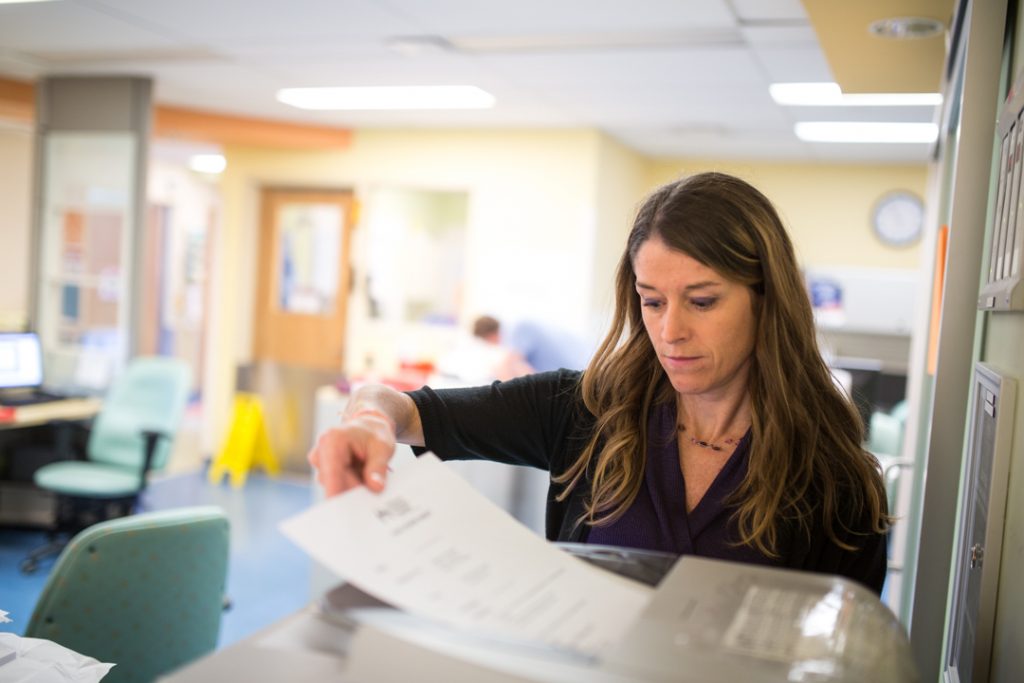
Managing taste changes during cancer treatment
Is cancer treatment leaving a bad taste in your mouth?
You’re not alone. Many cancer patients experience a change in the way food tastes and smells when undergoing chemotherapy and radiation treatment. For some patients, food has a nasty metallic taste. For others, food may taste exceedingly bitter or sweet. And some patients completely lose their sense of taste and smell during treatment.
“It’s important to make every bite count.”
Chemotherapy drugs attack rapidly-growing cells including those responsible for taste. For most chemotherapy patients, their sense of taste and smell typically returns a few weeks or months after their last treatment, says registered dietitian Karen Biggs, who works with the supportive and palliative care program at Hamilton Health Sciences’ Juravinski Hospital and Cancer Centre. Biggs has spent the past 35 years working with cancer patients and has a master’s degree in health sciences.

Karen Biggs, HHS registered dietitian
Patients treated with radiation to the neck or mouth also may find that their sense of taste and smell changes or disappears, since this therapy can harm taste buds and salivary glands. It can take months for these senses to return to normal. In some cases the change may be permanent.
Helpful tips
“While undergoing cancer treatment, it’s extremely important to avoid excessive weight loss and dehydration that comes with not eating or drinking enough,” says Biggs. “Altered taste is a very difficult side effect for patients to deal with, nutritionally.”
Biggs encourages patients to rinse their mouth with a mixture of baking soda and water several times a day to help keep it clean and wash away any lingering bad taste.
“And this next tip may sound obvious, but focus on foods and drinks that taste good,” says Biggs. For example, many patients find that they can tolerate chocolate milk better than most other fluids. “Find what works for you.”
Patients who tolerate liquids well can also use fluids with meals to wash any bad tastes out of their mouth.
While some patients don’t manage liquids well, it’s important to stay hydrated. This means finding fluids they can tolerate such as flavoured water or nutritional drinks and shakes. Biggs encourages these patients to try a wide variety of fluids in order to find drinks they can hold down.
A lack of fluids can lead to a dry mouth, which can further affect taste changes. Dehydration can lead to fevers, vomiting and diarrhea. If serious enough, such side effects can mean a visit to the cancer centre, an emergency department, or even hospital admission.
Small meals and snacks throughout the day may be easier to tolerate than the traditional three meals a day. “It’s especially important to aim for high-protein foods instead of empty calories,” says Biggs. “Try new foods or brands that you may not usually eat.”
Between meals, hard sugar-free candies, mints or gum may help to cope with the bad taste in your mouth.
If food tastes metallic:
- Try using plastic cutlery instead of metal utensils. Use glass cookware instead of metal pots and pans.
- Choose proteins with mild flavours such as chicken, turkey, tofu, fish and eggs.
- Foods that are cold or at room temperature may be easier to tolerate. Frozen fruit like grapes, melon or oranges can also be helpful choices.
If food tastes too sweet:
- Dilute drinks so they don’t taste as sweet.
- Add a pinch of salt to decrease sweetness.
If food tastes too salty:
- Choose low salt or sodium reduced products.
- Add a pinch of sugar or honey.
- Use herbs and seasonings in place of salt when cooking.
If food tastes bitter:
- Try sprinkling sugar, maple syrup or honey on food or add to drinks.
- Include fruits or sweet condiments like chutney with meals.
- Try ginger-flavoured water or mint tea with meals.
If food tastes bland or has no flavour:
- Try sour or tart food and drinks.
- Use condiments, herbs and seasonings to ramp up flavour, or go in the opposite direction by choosing foods with less flavor to manage expectations around taste.
- Try a variety of textures and colours.
If food tastes bad:
- Try adding a sauce or gravy, since the extra moisture could make foods easier to eat.
- Try soft, smooth, creamy or blended foods that require less chewing.
- Keep trying new foods until you find something you can tolerate.
If foods have a strong smell:
- Cover drinks with a lid, and drink with a straw.
- Avoid stuffy rooms and use a kitchen fan when cooking.
- Sit near an open window for fresh air.
Biggs encourages patients to keep experimenting until they find foods and liquids they can tolerate.
“It’s important to make every bite count,” she says. “Eating well during cancer treatment can help you feel better and keep up your strength and energy.”
With background from “Oncology Nutrition” — the BC Cancer Agency


